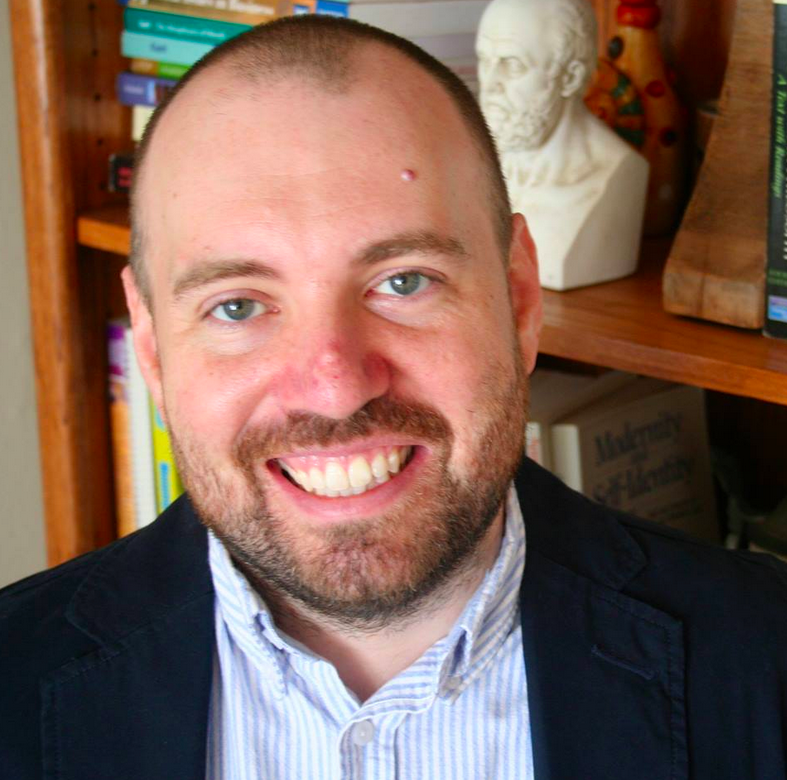Conference Proceedings
Publication Types:
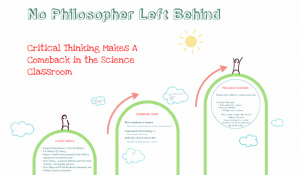
No Philosopher Left Behind: Critical Thinking Makes a Comeback in the Science Classroom (Abstract)
Abstract
Historically, science education has been inquiry-based, focusing on learning through questioning and experimenting. This emphasis on inquiry-based science was seen in the rise of Western philosophy through the Pre-Socratics such as Thales and emphasized in the work of later polymaths such as Gottfried Leibniz and Francis Bacon. Modern American science education, particularly since the passing of No Child Left Behind, has been focused instead on fact-based education. From an educational perspective, the fields of both science and philosophy have faced criticism as the U.S. falls behind in world education, particularly in the STEM (Science, Technology, Engineering, Mathematics) areas.
The authors of this presentation argue that science and philosophy education are both at an important juncture where innovation is needed, and improvements could be made by allowing each to learn from the strengths of the other. The next generation of science standards being released offer a step in the right direction, featuring 8 main ideas based heavily on inquiry. Through a consideration of these standards and a historical understanding of science and philosophy, we suggest a path forward for both scientific and philosophical education.
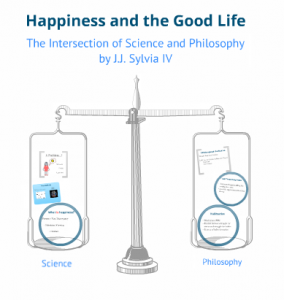
Happiness and the Good Life: The Intersection of Science and Philosophy (Abstract)
Abstract
The rising prominence of positive psychology has increased focus on the scientific study of happiness, ranging from social science to neuroscience and leading to a voluminous variety of publications explaining how to increase happiness. Only recently has this idea of the scientific study of happiness been challenged, most notably through works such as Against Happiness by Eric Wilson and The Antidote: Happiness for People Who Can’t Stand Positive Thinking by Oliver Burkeman. Although differing in thesis, both books sound the common alarm that the Western focus on happiness has become excessive to the point of being detrimental.
I argue that these contradictory positions can be reconciled by introducing philosophic reflection. This presentation will consider how the aim of positive psychology could be improved by broadening the concept of happiness to the good life. Much of the research of positive psychology seems to imply that the achievement of happiness simply is the good life. Considered philosophically, particularly through the lens of Aristotelian virtue ethics, happiness, though important, is only a portion of the good life. The combination of the scientific study of happiness and the philosophic pursuit of the good life can lead to a richer understanding of modern life and the quest for happiness and the good life.
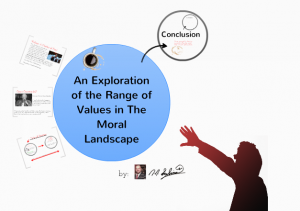
An Exploration of the Range of Values in the Moral Landscape (Abstract)
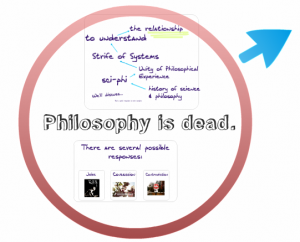
An Investigation into the Alleged Death of Philosophy (Abstract)
Stephen Hawking’s recently released “The Grand Design” claims on the first page that philosophy is dead because it hasn’t kept up with the sciences. Several strategies for responding to this claim have been taken, ranging from ceding that the branch of philosophy known as metaphysics may be dead to claiming that doing any science at all requires a philosophic framework.
After briefly discussing the historical relationship between philosophy and science, I will argue that the current relationship is somewhat more complex and subtle.
First, in many fields scientists and philosophers are working together closely on contemporary issues such as understanding the concepts of ‘species’ in biology or ‘consciousness’ in neuroscience. I will argue that this sci-phi collaboration is beneficial for both science and philosophy, and has application to several branches of philosophy including ethics.
Second, I argue that science can, in a meaningful way, be equated to philosophy. Many scientists claim that they have no need for philosophy in their day-to-day work. This is likely true for the many scientists who are doing the work that Thomas Kuhn would call “puzzle solving.” However, scientific work that is pushing boundaries or asking questions that might lead to a shift in paradigm resembles the traditional work of metaphysics, in that what changes is not the evidence of experimental results, but rather the interpretation of the very same results. If Hawking concludes that philosophy is dead, it is only because he is firmly entrenched within a particular paradigm.
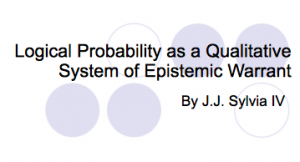
Logical Probability as a Qualitative System of Epistemic Warrant (Abstract)
Abstract
Qualitative probability has emerged as an important concept for fields as varied as medicine and artificial intelligence. In technical fields such as these, it is often not possible to assign a real or accurate numerical degree of belief to a particular proposition as required by the Bayesian system, yet decisions relying on the epistemic warrant of the statement must be made, despite the fact that certainty does not exist. The benefits of a qualitative system are considered, with particular emphasis on the Lockean Thesis. The Lockean Thesis is found well developed, but lacking any method of determining when or how one is epistemically warranted in a particular belief. Several solutions are considered, but ultimately virtuoso epistemology is briefly explained and suggested as an addition to the Lockean Thesis in order to overcome this difficulty.
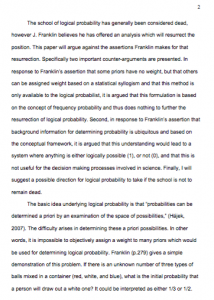
A Critical Assessment of the Resurrection of Logical Probability (Abstract)
Introduction
The school of logical probability has generally been considered dead, however J. Franklin believes he has offered an analysis which will resurrect the position. This paper will argue against the assertions Franklin makes for that resurrection. Specifically two important counter-arguments are presented. In response to Franklin’s assertion that some priors have no weight, but that others can be assigned weight based on a statistical syllogism and that this method is only available to the logical probabilist, it is argued that this formulation is based on the concept of frequency probability and thus does nothing to further the resurrection of logical probability. Second, in response to Franklin’s assertion that background information for determining probability is ubiquitous and based on the conceptual framework, it is argued that this understanding would lead to a system where anything is either logically possible (1), or not (0), and that this is not useful for the decision making processes involved in science. Finally, I will suggest a possible direction for logical probability to take if the school is not to remain dead.
